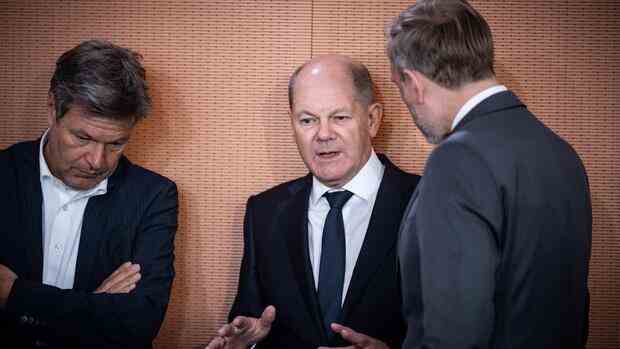Chancellor Olaf Scholz (M, SPD) talks to Christian Lindner (r, FDP) and Robert Habeck (Bündnis 90/Die Grünen).
(Photo: dpa)
Berlin Despite a marathon meeting that lasted a whole night and a half in the Chancellery, the traffic light coalition was unable to reach agreement on numerous controversial issues. SPD, Greens and FDP announced on Monday afternoon that the coalition committee had interrupted its deliberations and adjourned to Tuesday. Chancellor Olaf Scholz (SPD) said after the meeting that the coalition had made “very, very good progress”. But apparently they were not so big that the government partners could announce concrete content.
For weeks, the coalition has not come to rest in the dispute over numerous topics such as planning acceleration and basic child security. Federal Finance Minister and FDP leader Christian Lindner has already had to shift the key points for the 2024 budget because the ideas of the three coalition parties are too far apart. Economics Minister Robert Habeck (Greens) had openly doubted the coalition’s will to progress last week.
The head of the Munich Ifo Institute, the economist Clemens Fuest, called on the traffic light coalition to first clarify the central questions of financial policy. “All other issues depend on that.”
Chancellor Olaf Scholz (SPD) had spread cautious optimism shortly before the start of the meeting. You will make a “small leap forward”. That didn’t seem unrealistic to observers.
Compromises were in the offing on some controversial issues, such as the ban on gas and oil heating. The long-discussed question of whether internal combustion engines should have a future beyond 2035 had already been settled. Finally, Federal Transport Minister Volker Wissing (FDP) agreed on a corresponding compromise with the EU Commission on Friday.
From 2024, new heating systems will be installed, each of which will be operated with at least 65 percent renewable energy.
(Photo: dpa)
And with the reform of the immigration of skilled workers and the further training law, there was also an agreement between the opponents involved in the blocked government alliance. The draft laws for both projects are now to be submitted to departmental coordination between the ministries involved.
Numerous traffic light projects are in the departmental coordination
However, that does not necessarily mean that they will be decided quickly. Because the mood in the self-proclaimed progressive coalition is now so tense that passing it on to departmental votes does not mean that a law will then go through the authorities without problems.
Instead, the ministries apparently like to block each other in further coordination. According to a survey by the Handelsblatt among all federal ministries, at least 37 projects are currently being coordinated by the departments. The health, transport and economy ministries did not provide any information.
Some of these bills make their usual way through the departmental vote. The survey found that at least eleven laws are currently stuck there because of reservations by individual ministries. The actual number of blocked projects is likely to be even higher, because a number of ministries did not want to provide any information on this point in the Handelsblatt survey, citing internal coordination processes in the government.
The stuck legislative projects are also unlikely to include all of the coalition’s controversial issues. Other projects that want to tackle individual parts of the coalition have not even made it into the departmental vote because reservations were already made by other ministries during the so-called early coordination. Since the conflicts from different subject areas are often amalgamated for party tactical reasons, everything is blocked in the end.
>> Read here: Putin comparison and targeted leaks: coalition climate reaches new low
The federal cabinet has decided on 15 projects so far this year, as a government spokesman said when asked by the Handelsblatt. In the first quarter of last year, when the traffic light started, there were still 20. In the whole of 2022, the cabinet even made 101 decisions. So it took a bit of imagination to follow the government spokesman who said late Monday morning: “The government is up and running.”
For CDU boss and opposition leader Friedrich Merz, it is clear after the adjourned coalition committee: “19 hours of constant argument in the chancellery without result. This federal government is standing k. o.” And with a view to the negotiators involved, that should have been at least literally correct on Monday afternoon.
More: Heating industry warns of scrapping bonus
